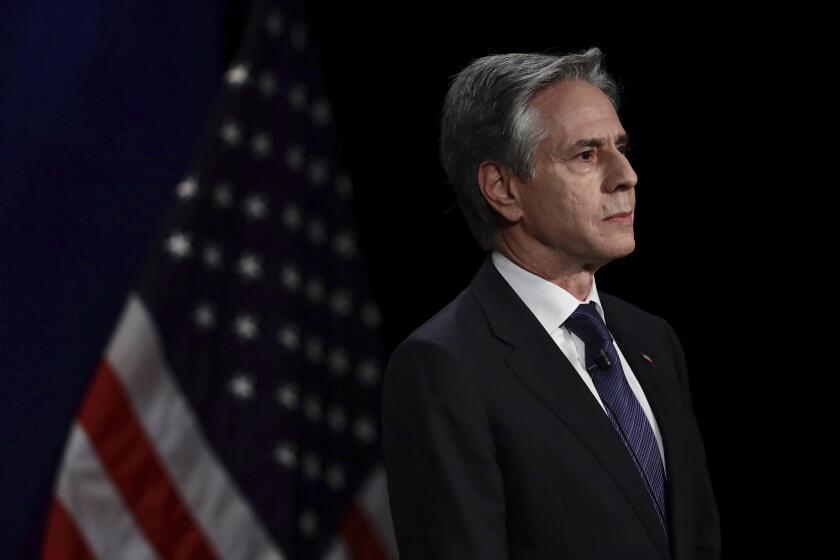Serb nationalist wins first round of voting
A hard-line nationalist edged out more moderate rivals in the first round of Serbia’s presidential election Sunday, a contest that many see as a referendum on the troubled country’s relationship with Europe.
A near-record turnout gave Tomislav Nikolic, deputy head of the Serbian Radical Party, about 39% of the vote, according to preliminary results with most of the votes counted. He will face incumbent President Boris Tadic in a runoff Feb. 3.
Tadic, a pro-Western reformer, came in second in a field of nine candidates with about 35%, according to the electoral commission and sample counts conducted by the Center for Free Elections and Democracy, an independent think tank in Belgrade.
The surprisingly high turnout, estimated at 60%, reflected the critical importance with which Serbs viewed the race and the impassioned attitudes that dominated it. Many Serbs feared a victory by Nikolic, whose party chairman is on trial for war crimes, would isolate the country and return it to pariah-state status.
Nikolic, however, appealed to nationalist pride among those who feel Serbia is still being punished by the West for the wars Belgrade waged in the 1990s. The most egregious example, many Serbs say, is the likelihood that Washington and much of Europe will recognize independence for Kosovo, a southern province of Serbia dominated by ethnic Albanians.
“Serbia showed today that it understands my desire for change,” Nikolic told supporters at his campaign headquarters Sunday night after early returns gave him the lead.
“We have never been closer to victory,” he declared. “We cannot be stopped.”
Tadic also opposes independence for Kosovo but would not sever ties with Europe because of it. He told supporters Sunday night that he had expected a second-place finish and was confident that he would prevail in the second round.
“And on that day there will be an opportunity one more time to win over Europe, a better life, better salaries, pensions, security . . . to win over Europe with our talents, capabilities, national and civic potentials,” he said.
Serbia’s last presidential election, in 2004, shaped up in almost identical fashion. Nikolic beat Tadic in the first round but neither passed the 50% threshold needed to avoid a runoff. Tadic, who heads the Democratic Party, won the second round.
Analysts predicted a high turnout for the upcoming runoff because so many voters feel so strongly about the paths represented by the two very different candidates. They offer a stark choice on fundamental matters such as ties with Europe, the possible loss of Kosovo, and relations with the West.
More than just an election, the runoff “will be a true referendum,” said Zoran Lucic, head of the Center for Free Elections and Democracy, speaking Sunday night on the B92 television network.
Although he toned down his rhetoric during the campaign, Nikolic belongs to an ultranationalist party that was an ally of the late dictator Slobodan Milosevic, who led what was then Yugoslavia through brutal wars as Bosnia-Herzegovina and Croatia seceded. Milosevic was ousted in 2000 and died during his trial for war crimes at the international tribunal at The Hague.
Vojislav Seselj, the head of Nikolic’s party, is on trial at The Hague.
In Zemun, a suburb of Belgrade where the Radicals are especially strong, voters spoke of utter disillusion with a pro-Western government that they said has done little to improve their daily lives.
Nikolic “will stop this corruption, this looting of Serbia, this robbery that they call privatization,” said Zivko Barisic, a 72-year-old retiree living on $270 a month. “If he wins we will have better lives,” he added. The government “has sold this country for nothing. . . . I have two sons and four grandchildren. I want them to have a better life. I don’t want that they live like dogs.”
Barisic added that Kosovo figured in his decision because he considered Nikolic to be the only candidate who would “defend” the breakaway province, which Serbs regard as the cradle of their Orthodox Christian faith, against the mostly Muslim ethnic Albanians.
At a busy polling station in downtown Belgrade, older voters outnumbered youths.
“I am not delighted by Tadic, but I know that he is the best candidate. He is moderate in every sense and that is what we need,” said Ljubica Mitrovic, a 67-year-old retiree.
“I am for the European Union, regardless of their behavior toward Serbia, not just when it comes to Kosovo, but in general,” she added. “I don’t like the way Europe has been treating us, but I think that moving toward Europe is the best way for all of us.”
--
Special correspondent Cirjakovic reported from Belgrade and Times staff writer Wilkinson from Rome.
More to Read
Sign up for Essential California
The most important California stories and recommendations in your inbox every morning.
You may occasionally receive promotional content from the Los Angeles Times.











